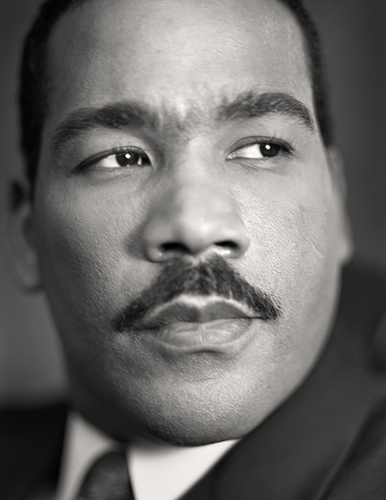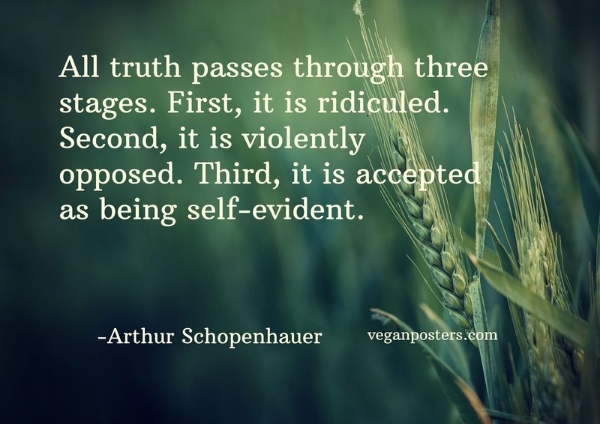Dear Vegans: Can't You Take a Joke?
Vegans and non-vegans alike may have noticed a sharp increase in widespread anti-vegan sentiment online lately, including two new popular videos going around that, shall we say, poke fun at vegans.
Vegans are intolerable hippies who make impossible, confusing, and downright absurd requests at restaurants and of their friends while wearing funny headbands. They tell you in a vapid, breathy voice that they’re vegan before they even tell you their name. They are overall just "the most annoying group of people known to mankind" and "think they’re better at life."
Oh, and if they choke or are stranded at sea, kill them/let them die.
In the world of "Bacon Fun," the only thing more fun than killing a pig is killing people who don't eat them!
Just as a few lil' examples.
One look at the comments sections of these videos shows that those being ridiculed have defended themselves, corrected misinformation, and some even reacted aggressively or used defamatory language – so it's then pointed out that all vegans are, in fact, mean and angry.
But wait – in the videos vegans were portrayed as illogical and daft, but at least they were peace-loving hippies. Now in the comments section they are all called a bunch of aggressive a-holes.
Which is it?
In truth, it doesn’t really matter which they are, the point is that there has to be something majorly wrong with vegans, and it must be funny to make fun of them... right? These are, after all, the minority of people who voluntarily don’t eat the meat, milk, and eggs of animals, wear their skin, or otherwise use them like normal people do.
Weird. Yeah, vegans are annoying. And they should get a sense of humor.
Here's the thing.
Veganism has absolutely exploded into the mainstream this year, which anyone not living under a rock has likely noticed. Therefore, the inevitable cognitive dissonance-induced vegan backlash that has always been brewing under the surface is now apparently occurring in full force. And since vegans are very much in the minority, it's like David and Goliath. It seems all you need to get more traction for your content is to find the anti-vegan angle in there – somewhere, anywhere.
(For example, if some people tragically die while climbing Mt. Everest and one is vegan, the headline is "Why Being Vegan Is a Bad Idea." Even TIME Magazine gets in on the viral fun. Yet another vegan successfully climbed Everest one freaking day before, which the media completely omitted.)
Kuntal Joisher, a vegan of 14 years, climbed and summited Everest on May 19th, 2016, the day before another vegan, Dr. Maria Strydom, tragically died trying. He calls the viral headlines blaming Strydom's death on her vegan diet "clearly irresponsible journalism and worst form of online click baiting" and urges people to "put this absolute BS controversy to rest."
To quote Dr. Casey Taft of Vegan Publishers, who is also a renowned domestic violence psychologist: “People try to mock vegans because they don't like to be reminded of the harm they do to animals.” It’s really that simple. As he points out, it's the same strategy that's been used to counter every social justice movement – propagating negative stereotypes in an attempt to try to silence people.
So maybe vegans could take a joke if non-vegans could take the truth. These videos and articles sensationalize or make a joke out of vegans, but they never coherently address veganism or animal use.
Because most people refuse to agree to become informed about animal use – or they fixate on selected, seemingly pleasant aspects they may have witnessed or grown up with while ignoring the many other inherently dreadful aspects – and they like it that way. They won’t look into the issue beyond a surface level or push past the typical stale justifications. They just simply flat-out refuse. I once did it, too. It is the very epitome of putting one's head in the sand and fingers is the ears while singing la-la-la-la.
Many of these very same people, however, are all too happy to do things like share anti-vegan content, tease vegans, brush off or trivialize them, and have an opinion about why veganism isn't an option for them and/or humanity and list a multitude of absurd justifications for this. (They are also the first to be vocal when a member of a comparably privileged species such as dogs is abused.)
Yet once we open the door to discovering how animal use is connected to so many of the urgent problems we face today, it's astounding – and it's freaking scary.
As one example of many, our Earth is currently in the middle of its sixth mass extinction, and scientific research shows that meat production is "likely the leading cause of modern species extinctions."
Most recently, findings published in PNAS by researchers from University of Oxford showed that if the world went vegan, food-related emissions would be slashed by 70%, trillions of dollars in healthcare saved, and 8.1 million human deaths avoided by 2050 (along with trillions more animals, of course).
Oh, and Newsweek specifies meat consumption as a leading factor driving the global water crisis that has already destabilized the Middle East, sparked civil wars in Syria and Yemen, and is now spreading to the US, which "could spark unrest across the world, and dire consequences." (They also discuss a leaked 2009 Nestle report warning the US government that our meat habit is draining the planet dry and will cause catastrophic consequences if nothing changes. This isn't PETA, this is a giant corporation which itself sells animal products.)
Worth talking about? Or "Dear vegans, shut up?"
When we actually allow ourselves to peel back the layers that normalize animal agriculture – which, in all its forms, requires doing mean, gross, and unnatural sh*t to animals at which still-sensitized people would instinctively recoil – we see it's not really what we thought it was. It's not a matter of some annoying person's extreme and personal "belief.” It's a matter of facts we either deny or accept.
Breeding, feeding, watering, and slaughtering tens of billions of animals each year and removing trillions of them from the oceans in a seemingly endless yet totally unsustainable, nightmarish cycle is counterproductive to our own interest in keeping the planet inhabitable – and also counterintuitive to our basic desire to love and protect animals. Having “dominion” over someone doesn’t involve systemically destroying them.
We are being made part of something we would never agree to – and deep down, we know it. Animal agriculture is an ethical, environmental, and human health catastrophe of epic proportions.
"Dear vegans, shut up" really means, "Dear veganism, go away. I preferred when you were an obscure fringe movement rarely mentioned by the mainstream. I don't want to change. I'm scared to change. You can't make me learn about this if I don't want to know."
Yet, no matter how strongly we try to convince ourselves we’re cool with it because "mmm, bacon," or how vehemently we try to absolve ourselves of responsibility, we continue to use embarrassing amounts of the planet’s increasingly scarce natural resources, much of which are turned into waste and pollution, to feed selectively-bred animals – each of whom enters a slaughterhouse as a very young, complex, sensitive creature and comes out chopped into bits.
I know, la-la-la-la-la. Please push through this with me!
Veganism is a real and rapidly-growing social justice solution for people, planet, and animals. In reality, vegans are an extremely diverse group of people of various ages, races, professions, and temperaments, including well-known social justice figures, a US senator and congressman, musicians, physicians, scientists, record-breaking athletes and many more.
Dexter Scott King is president of the Martin Luther King Jr. Center for Non-violent Social Change and has been vegan for more than 20 years, which he has said is the logical extension of his father’s philosophy regarding non-violence.
US Congressman Ted Deutch says: "I think a lot more about what we eat and the impact that it has not just on our bodies, but on our environment and on our world — and that’s a direct result of my decision to become a vegan.” He should probably wear a silly headband like JP Sears.
It’s a lot easier to trivialize and dismiss the movement as something for vapid, shallow, ill-informed people than to admit that vegans are actually on to something huge.
Yet, while these silly videos and articles circulate, right now in France for example, a huge national discussion is actually taking place, exposing the "chilling" systemic cruelty that occurs in slaughterhouses in order for people to eat the meat, dairy and eggs of animals and use the resulting byproducts. According to a French acquaintance, “Almost every week there are now talk shows on national TV or on the radio and articles in major publications about animal cruelty in slaughterhouses, speciesism, and veganism. Recently, it was the cover story and a 6-page article in one of the top 3 newspapers in France, Liberation. The tittle is: 'Slaughterhouses: we are all accomplices of this atrocity.'”
The recent 6-page cover story on one of France's top newspapers says: "Slaughterhouses, we are all accomplices of this atrocity." In her video "Dear Vegans," Nicole Arbour imitates the voices of the lambs and sheep she eats and wears.
As one mainstream story after next comes out, it really is unprecedented, and it’s a huge shake-up to the status quo – and some people really don’t like that.
Ridicule is actually a great sign, as a famous German philosopher once pointed out – he said all truth passes through the stage of being ridiculed before becoming self-evident. (Next is violent opposition, so not really looking forward to that one either.) Gandhi echoed this when he said, "First they ignore you, then they laugh at you, then they fight you, then you win."
Famous 18/19th century German philosophers know their sh*t.
The truth is that non-veganism is what's actually been dishonestly forced down our throats since childhood, because it requires the most resources and therefore results in the most profit. Tens of billions of animals who each and every year are bred, fattened up, slaughtered, processed, butchered, and packaged – and transported and refrigerated at multiple points along the way – obviously balloon agriculture to a size much larger than it would otherwise be. We could instead eat plants and make yummy stuff out of them instead of eating the animals that eat the plants, thus removing the totally inefficient “middleman” – someone who also happens to have interests and desires that don’t include being some anonymous, doomed human resource.
We've been told deceitful fairy tales, and then as we get older we suspend our disbelief along with everyone else in order to maintain our acquired tastes and to avoid sticking out from the group. So we don’t even realize that, for example, dairy is the lactation of continuously impregnated cows whose precious calves are removed from them shortly after each birth, with the mamas themselves killed after birthing 4-10 babies they never raise. Dairy cheese on average requires ten times the milk, ten times the suffering. And most also don't know that eggs come from grown chicks who weren’t born to the highly maternal mother chickens we imagine, but in energy-intensive artificial incubators, with roughly half killed shortly after hatching just for being male regardless of how pastoral the future setting for the remaining females, who will also either die prematurely and painfully due to the bodily consequences of her selective breeding or via slaughter at human hands when no longer profitable.
And when we hear “humane slaughter” we don’t ask what that entails. Normal people don't Google this, right? Well, it mostly consists of just stunning the animal before slaughter. This usually means either firing a steel bolt into animal’s skull, which may or may not destroy part of the brain (and the first shot is ineffective about 5% of the time in best case scenarios) or CO2 gassing, which results in a burning and then drowning-like sensation and can cause around 15-30 seconds of very severe suffering prior to the animals losing consciousness. Again, that includes animals raised for meat as well as milk and eggs once they’re “spent.”
We've been scared into believing it's somehow necessary for humans to consume animal slaughter products regardless of their circumstances, when the world’s largest organization of food and nutrition professionals and its international counterparts declare a vegan diet is healthful and appropriate for all stages of life.
Veganism is simply realizing there's a better, more logical way, on all counts, despite how badly society at large wants everyone to maintain the harmful status quo. And this transition, while generally seen as a sacrifice, actually opens our lives up in ways we never previously imagined. Believe it or not – and I know at one time I could not believe this could be true – it’s actually a very positive, enjoyable, and rewarding experience (when we’re not being heckled)!
Before I wrap this up, I’ve got to address one more popular meme going around: what about all the land cleared to grow crops vegans (and non-vegans) eat, and crop farmers who kill animals that endanger their crops?
The logical answer is that, of course, far more crop farming is needed to support animal agriculture due to low feed conversion ratios (FCR), so non-veganism is responsible for far more of the dilemma described. This explains why research just published in Nature Communications says if the whole world becomes vegan, the global population in 2050 could eat enough without further deforestation – meaning without another tree being cut down for food. Right now, per UN FAO LEAD, 2/3 of all agricultural land is used for "livestock." That's downright shameful. Humans are grossly outnumbered by the farmed animals constantly bred into very brief existences. Globally, this is what that looks like:
Global Source:Harvesting the Biosphere: The Human Impact by Vaclav Smil
http://bit.ly/1PAhMBJ
Alas, the anti-vegan content will likely just keep coming, and trying to respond to it all would be impossible, bringing to mind the hopelessly frustrating arcade game "whack-a-mole" in which you're set up to fail (in retrospect, decidedly not a very vegan game!)
But if people can create, like or share anti-vegan videos, memes, and articles, or even just trivialize or dismiss the idea offhandedly – all while expecting vegans to laugh with them – they should be able to coherently answer questions like the following:
Which innocent and vulnerable animals should we protect and which should we intentionally and avoidably harm against their will?
What is the right method to kill a day-old fluffy yellow chick who was born the wrong gender so won't lay eggs?
How should hens and cows who have had their female reproductive systems aggressively manipulated for their lactations, resulting in prematurely exhausted bodies, be killed?
When should a newborn calf or baby goat, often with umbilical cord still attached, be separated from his or her highly maternal mama so people can take her milk for themselves?
Why should a healthy animal forced into the world by humans, and who is barely in the prime of his or her life, then be forced against their will by humans to leave this world?
How should the people tasked with killing hundreds of animals an hour deal with the trauma of constantly doing so day in and day out?
Remember, the above is done to accommodate a socially-accepted human vice, not a vital human need. Do the research for yourself. Push beyond the first answers you get. Push yourself to learn about things you really don't want to. Read a book, watch a documentary, read articles about this. Fact-check everything.
You may find you're instinctively making a joke of vegans and veganism because deep down you knew the truth would hurt too much. Because it's likely you would never pay someone to deliberately hurt an innocent animal unnecessarily if you really thought about it, let alone do so yourself. Well, you don't have to. There are plenty of delicious and fashionable alternatives available, so if you can reasonably access them there’s no reason to keep supporting the animal slaughter industry. Insisting on doing so anyway means you specifically prefer animals to be unnecessarily killed. Think about it.
Yes, I can take a joke. But when people refuse to acknowledge glaring truths and to become informed about a horrific atrocity and instead make a joke of something they don’t understand – it’s not really funny. It’s just sad and incredibly frustrating.
So perhaps it’s not that vegans can’t take a joke. Perhaps it’s that non-vegans can’t take the truth, so instead they make a joke. About vegans. They mock vegans without talking about veganism or animal agriculture and other animal use.
In truth, to paraphrase the activist and intersectional educator Christopher-Sebastian McJetters, if you really believed in the inherent wrongness of totally unnecessary and avoidable systemic exploitation and killing, then you would go vegan too.
Shut up, vegan! No one asked you!
¯\_(ツ)_/¯
Me hanging out with Pumpkin at Maple Farm Sanctuary in Mendon, MA, where I volunteer helping animals rescued from... how do I say this... the people who want to eat them.
To see what kind of food vegans really eat, see the popular #whatveganseat and #veganfoodshare hashtags on Instagram.









